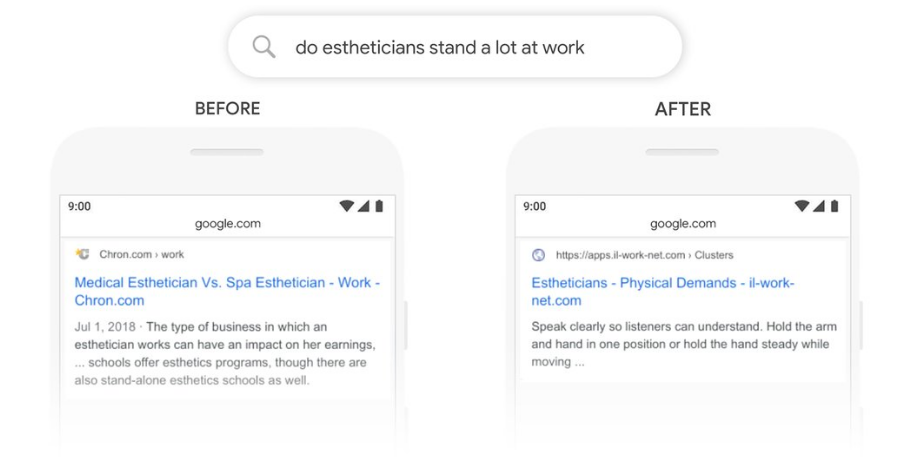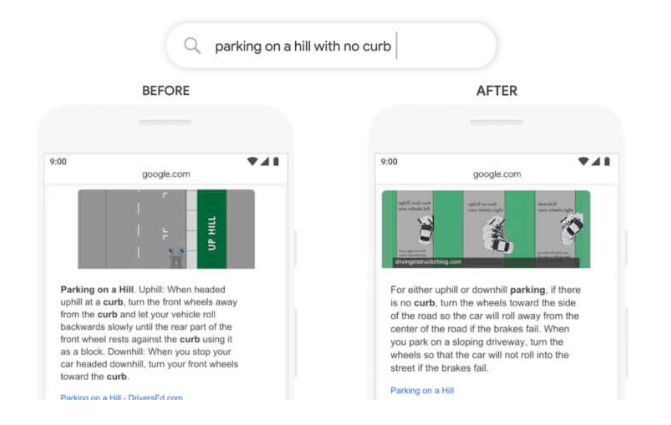We all realize that Google tweaks their search algorithm every day. However, major updates are fairly rare and Google now provides significant time to marketers. The recent announcement continues to push search towards understanding the intent and context behind search queries. Ultimately, the Google BERT update aims at improving natural language search inquiries.
What is the Google BERT update?
At the end of October 2019, Google announced BERT, which stands for Bidirectional Encoder Representations from Transformers. BERT, which Google announced in 2018, created a neural network-based technique for natural language processing. Essentially, neural networks aim at teaching computers to think like a human brain.
“The original goal of the neural network approach was to solve problems in the same way that a human brain would. However, over time, attention moved to performing specific tasks, leading to deviations from biology. Neural networks have been used on a variety of tasks, including computer vision, speech recognition, machine translation, social network filtering, playing board and video games, medical diagnosis and even in activities that have traditionally been considered as reserved to humans, like painting.”
Google notes the breakthrough derived from research on transformers, which enabled the algorithm to process words in a sentence. Conversely, prior to the BERT update, the algorithm processed words individually. As a result of BERT, the algorithm now contains the ability to process the context and intent of a search query.
How does the BERT update impact search?
Naturally, the question arises about how the Google BERT update impacts search results. According to Google, the update impacts about 10% of search results. Additionally, the impacted search results relate to long-tail keywords.
To provide an example of how the BERT update impacts search queries, Google offered a few highlights of the natural language processing power. At a high level, the update focuses on the meaning of many common prepositions, which previously had a significant impact on results.

As you can see in the example, prior to BERT, a common search about an actual activity returned a generic result. For a searcher, this is not a helpful result because the query wanted to know a yes or no question. However, following the BERT update, the results provide a page related to the demands of estheticians. This is a much better result and should answer the intent of the search query.
Finally, the biggest impact of the update may relate to featured snippets. Google indicated that featured snippets would be impacted across the globe. For more, Search Engine Land offered some analysis of how the update potentially impacts featured snippets.

In the “parking on a hill with no curb” search query, the featured snippet examples show vast differences. First, prior to BERT, this query (or something similar) confused the search algorithm, which placed too much emphasis on “curb” and ignored the word “no”. The algorithm did not understand how critical “no” was to appropriately returning relevant results (and offer a relevant featured snippet). As a result, previously, searchers would see results for parking on a hill with a curb. However, with the update (as the example shows), searchers see a useful response!
How does the Google BERT update mean for SEO and my site?
Interestingly, SEO experts see limited impact (currently) for SERPS and underlying site health. For instance, due to the focus on long-tail keywords that are captured in the update, most of the high ranking terms are not affected. However, take a look at your analytics and keyword tracking tools to see if the update made a difference for your site rankings.
“We’d recommend you check to see your search traffic changes and see how much your site was impacted by this change. If it was, drill deeper into which landing pages were impacted and for which queries. You may notice that those pages didn’t convert and the search traffic Google sent those pages didn’t end up actually being useful.”
Ultimately, the BERT update helps Google understand natural language. As a result, marketers should continue to write engaging content aimed at customers. Previously, SEO experts recommended writing content aimed at the algorithm. Although the SEO world is well beyond the days of keyword stuffing, many sites still contain “robotically-written” content that lacks engagement. So, while making on-page SEO optimizations, continue to make changes that make your content more readable to people.
For more on how the BERT update impacts your site and what you should do to keep your site ranking well, we rounded up some expert opinions.
- Search Engine Journal notes that BERT is just the beginning, so focus on readable content.
“Google’s BERT Update improves how Google understands search queries. BERT analyzes search queries, not web pages. However, on page SEO becomes more important in terms of using words in precise ways. Sloppy content may not be helped by the Google BERT update.”
- Neil Patel recommends focusing on long-tail keywords.
“If you want to do well when it comes to ranking for informational keywords, go very specific and answer the question better than your competitors. From videos and images to audio, do whatever needs to be done to create a better experience. Now to be clear, this doesn’t mean that long-form content doesn’t work. It’s just that every SEO already focuses on long-form content. They are going after generic head terms that can be interpreted in 100 different ways and that’s why the content may be long and thorough. In other words, focus more on long-tail terms.”
- Search Engine Land reminds marketers to stay focused on their strategy.
“We are seeing a lot of folks asking about how they can improve their sites now that BERT is out in the wild. That’s not the way to think about BERT. Google has already stated there is no real way to optimize for it. Its function is to help Google better understand searchers’ intent when they search in natural language. The upside for SEOs and content creators is they can be less concerned about “writing for the machines.” Focus on writing great content — for real people. Continue with your strategy to write the best content for your users. Don’t do anything special for BERT, but rather, be special for your users. If you are writing for people, you are already “optimizing” for Google’s BERT algorithm.”
As always, Google continuously makes changes aimed at the end user. As a marketer and/or SEO specialist, continue making updates that provide more value to site visitors and your site should continue to rank well. Although no site is “Google-proof” thinking like Google and providing value-add information helps keep you aligned with the algorithm.





